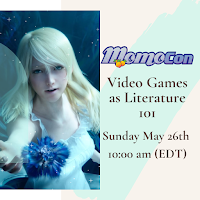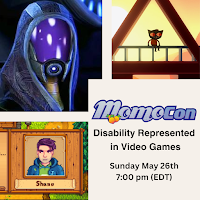
Video Games as Literature 101: MomoCon 2024 Panel

Announcing MomoCon 2024 Panels by Video Games as Literature
It is almost time once again for MomoCon 2024, which will be taking place Memorial Day Weekend in Atlanta, GA! This year Video Games as Literature will be presenting two panels at MomoCon, both on Sunday. As in previous years, the panels will be streaming live on Instagram at the @VideoGamesAsLit Instagram account, and videos of each panel will be uploaded to YouTube after the convention so everyone will be able to access them. If you want to watch the live stream, don't forget to follow the Instagram account and click the reminder bell! If you missed MomoCon panels from previous years, here is a handy playlist where you can watch all of them. Keep reading for specific details on when and where the Video Games as Literature panels will take place, and for more information about MomoCon in general.

Critical Hits: Writers Playing Video Games edited by J. Robert Lennon and Carmen Maria Machado (Review)
Thank you to the editors at Graywolf Press for gifting me an advance review copy of this book. Links to books or other products may contain affiliate links whereby I may earn a small commission.
Critical Hits is a thoroughly new take on the growing video game writing genre in that a variety of authors have come together to write individual personal essays where they relate their gaming lives with other aspects of life, literature, and individual topics of interest. When I first heard about this book I was thrilled to be able to read and review it, as the premise sounded perfect for me, but now that I have the book in my hands I must say it has far exceeded my expectations and will be added to my list of all-time favorites.
Since Critical Hits is a collection of essays and stories, I feel that it can't necessarily be reviewed as a whole body and I will instead review a few of the stories that stood out to me individually. I do want to note on the book as a whole, however, that one thing I noticed which could be a problem for some readers is that the stories have no qualms about sharing spoilers for the video games they are discussing. To read this book the audience must either not be bothered by major spoilers, or they must have already played every game mentioned in the book. I am personally somewhere in between. Thankfully I have already played many older AAA titles that are mentioned, such as The Last of Us and Dragon Age: Inquisition. But newer games, like Assassin's Creed: Valhalla, are still on my (enormous and ever growing) backlog. As a person who does not like to have stories spoiled, this did cause some difficulty for me while reading the book.
The first section of the book I'd like to discuss in detail is the Introduction by Carmen Maria Machado and the first story, "I Struggled a Long Time with Surviving" by Elissa Washuta. Both of these works felt intimately relatable to me. Machado's description of her family's feelings about video games -- her mother's disdain and eventual relaxation of the "no video games" policy for the little brother was directly parallel to my own experience growing up. Like Machado I was a late bloomer when it came to experiencing games, though certainly not by choice. I felt seen not only by this description of her life experience, but also by the specific experiences that Machado describes with various games -- experiences that again almost directly mirrored my own. Washuta's "I Struggled a Long Time with Surviving" was similarly relatable for me. The story begins with the statement:
Summer is here again and I miss my friends. I don't mean the real ones I've forgotten to talk to because I have no news to share but symptoms. I do miss them. But I'm referring to my imaginary video game friends, my good influences who never produce anything but spiked bats and health kits and other things they carry to keep them alive. (3)
In these four brief sentences Washuta has summed up the reason that I spend the vast majority of my time playing video games AND the reason I see my "real life" friends only once a year, at most: I am sick. I can't go out, and people are too bummed to come visit me. But my video game friends (like Joel and Ellie, friends I share with Washuta) are always here when I need them. Upon further reading, I discovered that Washuta actually has exactly the same condition I have, with many of the same symptoms, including a mysterious heart condition. For me, personally, it is comforting to know that another writer is out there sitting in front of the TV, suffering with the same debilitating symptoms that I have, and possibly playing the same game I'm playing (it is probably time for me to play The Last of Us Remake). Others with chronic illnesses may also find comfort in this story, and in those first few words. It feels like community, and somehow our video game friends are a part of that community.
In the story "Mule Milk," author Keith S. Wilson links an eclectic variety of topics to Final Fantasy VI. I was completely wrapped up in Wilson's story, connecting race and nature and otherness to protagonist Terra's struggles in Final Fantasy VI. Wilson asks, "What is nature? I've been wondering, because Black poets, even those who write explicitly about nature using the word nature, are seldom considered nature poets" (38). I consider myself to be a nature writer, and I think a lot about who is considered a "Nature Writer" and who is simply a person who mentions nature in their writings and studies. Therefore I really vibed with Wilson's essay. I also appreciate that he mentions a love of pigeons, an animal that I, too, could wax poetic about to a complete stranger on the street.
Many other stories in this anthology moved me, including an essay in comic format by MariNaomi, but as this review is already quite long I think I need to wrap it up. TLDR: I would say that from cover to cover this book is worth reading in full and I would recommend it to anyone I know personally, including my closest and dearest relatives, friends I haven't seen in decades, and even my racist uncle, who could learn a few things but may also find that he secretly enjoys some of the stories.
This review can also be read in full on Goodreads, linked here.










